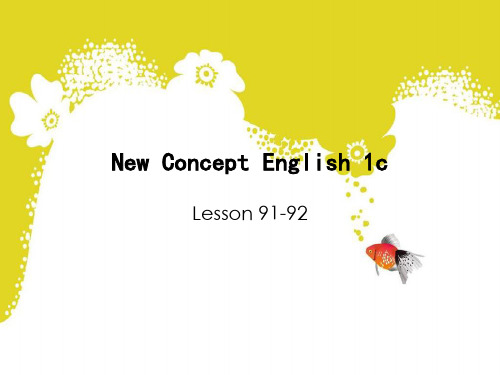新概念英语第一册第91课课件
- 格式:doc
- 大小:22.50 KB
- 文档页数:11




(完整版)新概念英语第⼀册第91课课件Lesson 91Poor Ian!1: still adv 还,依旧I still can’t decide where to go.⑴静⽌地Eg: He is sitting still.2: move V 搬家⑴Move from…to…从…搬到…Eg: They move from Nanjing to Shenzhen.⑵移动Don’t move that chair.⑶使感动,使动⼼Eg: Her song moved us greatly.3: miss V 想念,思念Eg: we will miss you very much if you move.I miss you so much!⑵注意到…的不存在When did you miss your bag?⑶错过或失去机会I missed a good chance. 4: neighbor N 邻居A good neighbor5: person N ⼈Eg: He is a nice person.In person 亲⾃,直接地Eg: He will go to get the money in person. Personal adj 个⼈的,私⼈的A personal letter6: people N ⼈们The people 民众,⼈民,国民7:poor adj 可怜的Eg: The poor old woman had no one to talk to.⑵贫穷的—richA poor manA poor villageThe poorEg: we should help the poor.⑶差劲的Be poor at sthBe poor at doing sthBe good at sthBe good at doing sthEg: My daughter is poor at swimming.Context:1: move to…搬家到…Eg: All her family have moved to the US.Move in 搬进(强调结果)Eg: His new neighbour moved in last week.Move out2: be going to do 打算做某事Eg: I’m not going to argue with you tonight.3: I’ll miss him.Miss 想念I miss my parents very mush.4: He has always been a good neighbour.现在完成时只要⽤于两种情况:1.表⽰在过去不确定的时间⾥发⽣的并与现在有着某种联系的动作2.开始于过去并持续到现在的动作5:all ⼤家,全部(3个或3个以上的⼈或物)两者6:new people 新住户Move into 搬进来(强调过程)Move in 搬进来(强调结果)7:give sb sthGive sth to sb 把…给某⼈Regards (复) 致意,问候Give him my regards Give my regards to him. 8: leave 离开Leave…for…离开…去…Eg: when will you leave China for England.Lesson 92When will…?语法:⼀般将来时⼀般将来时表⽰将来某⼀时刻的动作,状态以及打算。


Lesson 91
Poor Ian!
1: still adv 还,依旧I still can’t decide where to go.
⑴静止地
Eg: He is sitting still. 2: move V 搬家
⑴Move from…to…从…搬到…
Eg: They move from Nanjing to Shenzhen.
⑵移动
Don’t move that chair.
⑶使感动,使动心
Eg: Her song moved us greatly.
3: miss V 想念,思念Eg: we will miss you very much if you move.
I miss you so much!
⑵注意到…的不存在
When did you miss your bag?
⑶错过或失去机会
I missed a good chance. 4: neighbor N 邻居
A good neighbor
5: person N 人
Eg: He is a nice person. In person 亲自,直接地Eg: He will go to get the money in person. Personal adj 个人的,私人的
A personal letter
6: people N 人们
The people 民众,人民,国民
7:poor adj 可怜的Eg: The poor old woman had no one to talk to.
⑵贫穷的— rich
A poor man
A poor village
The poor
Eg: we should help the poor.
⑶差劲的
Be poor at sth
Be poor at doing sth
Be good at sth
Be good at doing sth Eg: My daughter is poor at swimming.
Context:
1: move to…搬家到…Eg: All her family have moved to the US.
Move in 搬进(强调结果)
Eg: His new neighbour moved in last week.
Move out
2: be going to do 打算做某事
Eg: I’m not going to argue with you tonight. 3: I’ll miss him.
Miss 想念
I miss my parents very mush.
4: He has always been a good neighbour.
现在完成时只要用于两种情况:
1.表示在过去不确定的时间里发生的并与现
在有着某种联系的动
作
2.开始于过去并持续到现在的动作
5:all 大家,全部(3个或3个以上的人或物)
两者
6: new people 新住户
Move into 搬进来(强调过程)
Move in 搬进来(强调结果)
7:give sb sth
Give sth to sb 把…给某人
Regards (复) 致意,问候
Give him my regards Give my regards to him. 8: leave 离开
Leave…for…离开…去…
Eg: when will you leave China for England.
Lesson 92
When will…?
语法:一般将来时
一般将来时表示将来某一时刻的动作,状态以及打算。
该时态一般与表示将来意义的时间状语连用。
Tomorrow,this month,The day after tomorrow Next week
In two days’ time 两天之后
From now on 从现在起
In the future
一般将来时的结构
肯定句:主语+ will / shall + 动词原形
疑问句:将助动词will/ shall 提前。
否定句:在will/ shall 的后面加not。
缩写形式:will not = won’t
Eg: He will (He’ll) come next week.
She will not (won’t) go to visit her friend this afternoon.
Will you see him tomorrow morning?
Yes, I will.
No, I won’t.。